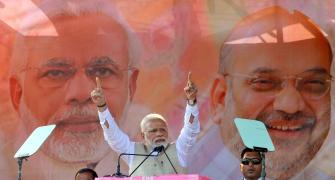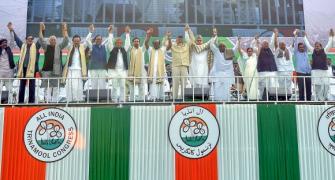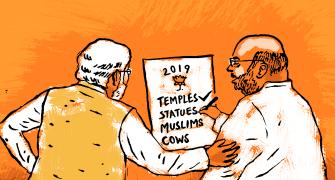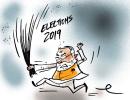'Whoever whispered in his ears that go for demonetisation, misled him completely' and the PM lacked the sagacity to know that it would not work, Yashwant Sinha tells Archis Mohan.
Illustration: Dominic Xavier/Rediff.com
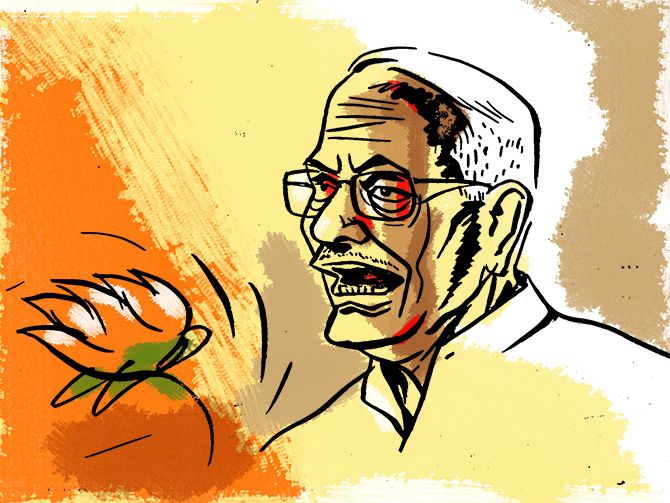
On a cold winter day, Yashwant Sinha sits snug near an oil heater behind a wooden desk in the small but well-furnished study of his tastefully maintained house in Noida. A shelf full of books covering the entire length and breadth of a wall stands behind him, and his swivel chair helps reach any book he might consider thumbing through. Not that Sinha, at 81, needs any reference notes.
He recalls conversations and events from years past, and spews granular economic data to bolster a point he is making.
The publisher and promoter of Sinha's new book, India Unmade: How the Modi Government Broke the Economy, would have him focus the interview on its contents, but the former Union finance minister, despite years in the bureaucracy, does not take orders easily. So we sit down for a freewheeling chat.
I was quite embarrassed when he had got up to welcome me in, and tell him as much and about how I had met him with my parents, who were acquainted with him, on a couple of occasions in the early 1980s. I was barely seven or eight years old then.
He was heading the Delhi Transport Corporation, and was on the brink of quitting the Indian Administrative Service after uproar over the death of an employee in police firing subsequent to a workers strike.
I tell him that I remember the meeting for the sole reason that it was probably my first taste of a carbonated beverage that he had offered us, despite my mother's protests.
A year later and having quit the IAS, Sinha was the new star in the Janata Party as Chandra Shekhar, the party chief, laid the foundation stone for an ashram in Bhondsi, then a dusty village outside the Gurugram city.
However, I remember little of Sinha, other than that he appeared the tallest and most smartly turned out in a sea of old men clad in white khadi kurta-pyjama. As a member of his household staff serves green tea with cashews and biscuits, I tell Sinha how I was much surprised to discover my favourite author in the gathering there, and was pleased no end that she was willing to have a chat with me over lunch.
It struck me years later that Nilima Sinha, the author of several children's books, was Sinha's wife.
Sinha, who had chuckled all along remembering his times with the "angry old Socialists" of the erstwhile Janata Party, gives out a hearty laugh as I end my anecdote.
Sinha, in turn, recounts how he once physically stopped one of the "angry Socialists" from marching out of a party meeting in protest. The leader was upset that a party resolution sought to insult the Socialist creed while Sinha wanted to prevent the leader from walking right into the arms of the press corps waiting outside the venue and the episode sparking a controversy.
Sinha was one of the earliest to back Narendra Damodardas Modi as the prime ministerial candidate of the Bharatiya Janata Party, and now he is one of the PM's most vocal critics. During our conversation, as we sip the lightly brewed green tea, Sinha is unsparing in his criticism of the PM and Arun Jaitley.
Despite his advancing years, Sinha has been on the road for the last 14 months since the run-up to the Gujarat assembly polls in December 2017, addressing public meetings and press conferences across the country to highlight the "mismanagement" he believes Modi and Jaitley have wrought on India.
Sinha says the Shramik Patrakar Sangh, founded in 1941, invited him in early December to deliver their annual lecture, but pleaded they did not have money to pay for his business class airfare, or a five-star hotel stay.
Alluding to the fact that he is not only tall but also old and needs leg space, Sinha says he sat in the cramped economy class seat. In the run-up to the Gujarat polls, Sinha covered the length and breadth of the state, travelling by road to address meetings in Rajkot, Surat and Ahmedabad.
Sinha, who served as finance minister in the Chandra Shekhar and Atal Bihari Vajpayee governments, says his disillusionment with Modi began with the government's demonetisation decision, which he calls a "silly thing to do" and "advertising that silly approach" by replacing Rs 1,000 currency notes with Rs 2,000.
"I was seeing the terrific mandate of 2014 being wasted day by day," Sinha says.
The former minister says "whoever whispered in his ears that go for demonetisation, misled him completely" and that the PM lacked the sagacity to know that it would not work, especially after he had created the infrastructure for converting black money into white through the Jan Dhan Yojana.
"Then all the money came back, so he must have felt cheated," Sinha says.
I ask him about the PM's working style, and Sinha says how people close to Modi have told him that he does not read, only wants power point presentations, which he will grasp but give him 10 pages of some note he will not read.
On the goods and services tax, Sinha says he felt "particularly distressed" because he, as the finance minister in the Vajpayee government, had carried out many reforms in indirect tax, and settled on three rates -- merit rate, demerit rate and a mean rate.
Sinha says his desire was to move to a single rate, and he was told that over 90% of all indirect tax revenue collected came those days was from mean rate. He bemoans how the finance minister did not provide leadership to the state finance ministers who cannot have the national vision, and the reform was hurriedly implemented.
Sinha says he would pore over the minutest of details when he prepared the annual Budget as finance minister.
"Do you get the feeling when you see the finance minister reading his Budget speech? I mean one would have read that speech 30, 40 times before actually getting up in the Lok Sabha and reading it. You will not fumble because you know what follows... every word... almost," he says, pointing at 400 changes in GST rates as evidence the FM did not "apply his mind".
However, even before his criticism of the Modi government's economic policies, Sinha and some other senior leaders had flagged problems ailing the BJP. That was right after the BJP's defeat in the Bihar assembly poll in November 2015, and the signatories to the press statement included Murli Manohar Joshi, Shanta Kumar and L K Advani.
Sinha says none in the party had the courage to speak those words now.
The former BJP leader says he told that group how during Advani's tenure as party president the standard operating procedure was for the leaders to meet at 11 am in the party office to discuss the news of the day, and decide the party line.
"It used to be a convivial gathering. There was no tension. Suddenly everything changed, and I am not talking of the period after we formed the government. It started changing with Nitin Gadkari who brought in a corporate style," he says.
Sinha says that earlier any state or district leader could come with the hope to meet Advani, even if he did not have an appointment. "I told Advani and Joshi all of this. I said this was not the party which I had joined. You people were so liberal; it was so different, what has happened? We then flagged the issue, but then they managed, I must say they managed Advani, Joshi and Shanta Kumar and that is why whatever we had started died a natural death."
Sinha says he then realised that he could not count on the support of even the seniors in the party to raise issues, and wrote his famous article in the Indian Express.
The former finance minister says it was "cheap" of the party to accuse him of looking for a sinecure. He says the party wanted him to contest the 2014 Lok Sabha polls, but he did not and that is when they picked his son Jayant Sinha as the party's candidate from that seat.
He says he quit the IAS, with no hope of where his next salary might come from, with 12 years of service left, and turned down V P Singh's offer when he wanted to make him a minister because he thought Singh was not being fair.
"I have invited uncertainties in my life with my unfortunate attitude. I have presented five Budgets and two interim Budgets. I did not want crumbs like finance commission chief or Niti Aayog or BRICS Bank chairmanship," he says.
Sinha says the BJP leadership then tried to make it personal, and made his son pen a counter article. They wanted to convert it into a family battle between the father and the son. Sinha concedes, when I ask him, that he was indeed queering the pitch for his son by doing what he is doing.
As it was time for me to leave, I ask him what would be his fatherly advice to his son. "My fatherly advice is that I would not give you any advice. You decide for yourself."


